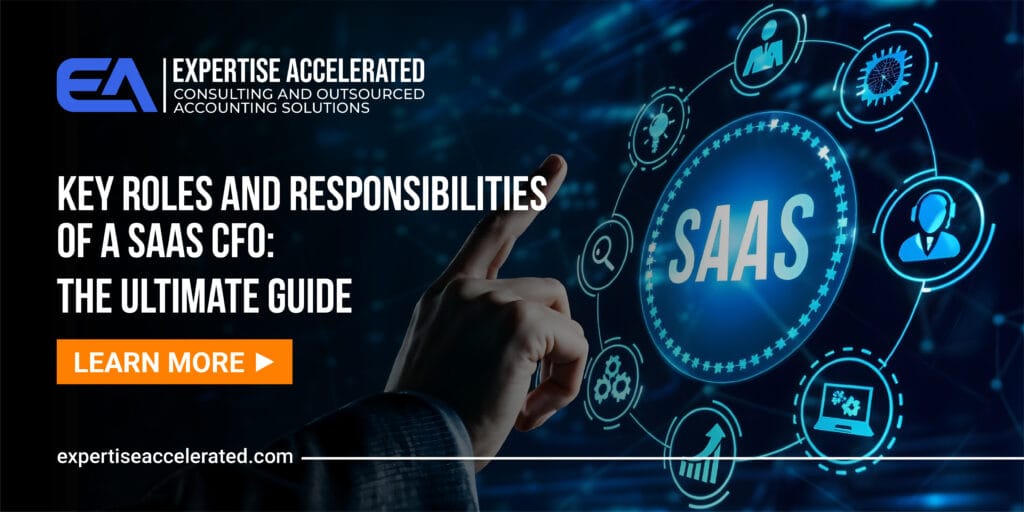Is SaaS CFO a must-have for your SaaS company?
As a leader, you know this all too well: recurring revenue can be a blessing or a curse. Without efficient financial strategies in place, your growth potential may quickly turn into a struggle for survival.
Many SaaS businesses begin without a SaaS CFO, assuming they can manage the company’s finances and scale the company on their own. But, as the business grows, the absence of a sharp CFO may snowball their financial mistakes into missed opportunities and costly missteps.
In this blog post, we’ll dive into what you can expect from a SaaS CFO, how he can improve your company’s financial strategy, and exactly how he can help you manage the complexities of scaling your SaaS company with confidence. Let’s get started.
What is a SaaS CFO?
A SaaS CFO has specific experience in the Software as a Service (SaaS) industry, from startups to enterprise level operating companies . A SaaS CFO understands the subscription software metrics that help companies track, interpret, and report customer behavior information.
Why is a SaaS CFO Different?
SaaS CFOs’ roles are more tailored to SaaS companies than the traditional CFOs. SaaS CFOs have an understanding of deferred revenues, churn metrics, and LTV/CAC ratios.
Here’s why this role stands out:
1. Recurring Revenue Complexity
SaaS CFOs manage monthly recurring revenue (MRR) and annual recurring revenue (ARR), ensuring these metrics align with business goals.
2. Investor Relations
With SaaS companies often reliant on venture capital, CFOs are instrumental in attracting and managing investors.
3. Scalability Challenges
Rapid scaling requires meticulous financial planning, scenario modeling, and resource allocation.
Some of the roles of a SaaS CFO evolves according to the SaaS company’s phase. However, there are certain roles that you can expect a SaaS CFO to carry out regardless of what stage your SaaS company is in.
The following are some of the common roles of a SaaS CFO across all stages:
Common Roles of a SaaS CFO Across All Stages | |
1. Accounting | Regardless of the stage of the SaaS company, the CFO is responsible for ensuring that the company’s accounting processes are both timely and accurate. While it is likely that the majority of the accounting duties will be delegated to the accounting/finance teams but a SaaS CFO you must ensure that everything is handled accordingly. This is particularly important if the SaaS company has little SaaS experience. |
2. Collaborate with other departments | A SaaS CFO works closely with other departments within the organization. For instance, the customer success team can offer insights into things like the status of customers, and subscriptions. This knowledge helps the CFO recover lost revenue and reduce churn. By having synergy with the other teams, the SaaS CFO understands how everything in the company is working and linked together. This helps the CFO in pulling all the knowledge and insights to build the overall story of the company. |
3. SaaS KPI and Metrics Management | Apart of the regular metrics, the SaaS CFO will analyze metrics specific to the SaaS industry such as average revenue per user, churn rates, (CLV) customer lifetime value, customer acquisition cost, customer acquisition cost ratio, monthly recurring revenue, net retention rates, sales outstanding in sales, and payback period. The CFO will track these metrics. He will also communicate and interpret them to the various departments to help them make the right decisions. |
What is the role of the CFO in a SaaS Startup?
The role of CFO in a SaaS startup involves helping the company manage burn rate while pursuing their initial growth. There are a lot of ways a SaaS CFO will achieve this, depending on the circumstances.
For instance, he will help allocate capital raised from investors to high-impact areas. Or he will be using financial models to predict cash flow under various growth scenarios and preparing for uncertainties.
 It has been seen that successful SaaS companies usually follow similar growth stages: pre-traction, initial traction, initial scale and scale.
It has been seen that successful SaaS companies usually follow similar growth stages: pre-traction, initial traction, initial scale and scale.
Let’s take a look at how those stages are defined and what the specific roles of the CFO are in each phase.
Pre Traction
The Pre Traction phase primarily focuses on developing the product, identifying the target market, and validating that the product meets customer needs.
At this early stage, the team typically consists of a small group of dedicated individuals working tirelessly to get the company off the ground. As a result, the financial operations might appear straightforward, often managed by an accountant handling day-to-day transactions.
While basic financial models and operations may seem sufficient, a CFO can set the right financial groundwork for startups from day one. For instance, if you are a bootstrapped startup then a CFO can help you manage accurate financial reporting and cash flow to avoid problems later on.
A CFO can guide a SaaS company from its startup phase to commercialization and profitability. As the company grows, the CFO’s role evolves, starting with managing transaction processing* and expanding to establishing systems that enable management to effectively oversee finances, cash flow, budgets/forecasts, sales analysis, and due diligence for successful fundraising efforts.
*Transaction processing refers to the management and execution of business transactions, often involving the recording, validation, and completion of financial or operational activities. This role ensures that transactions are accurately captured, processed, and reflected in the company’s financial records or systems.
Here are several ways a CFO can help establish a strong financial foundation for your SaaS company:
Implement the accounting software,
automate routine processes,
set financial controls and compliance,
set key SaaS financial metrics,
create financial forecasts and budgets,
and build a finance team.
Carrying out these steps is important as it prepares startups for sustainable growth and financial resilience. Failing to set a strong financial ground early on may cause problems at the later stages, as discussed in the following sections. This is especially important in an environment where about one in five startups fail within their first year.
Initial Traction
The day-to-day activities at the initial traction phase of a SaaS startup are often centered around building the product, acquiring early customers, refining processes, and ensuring the business model is viable.
At this stage, it is also a good idea for the company to begin setting up a structured accounting system. While the management has a long to-do list, ranging from bug fixes and gathering user feedback to adding updates and generating leads, a CFO can play a key role in streamlining financial processes and ensuring accuracy. Here’s how:
- By setting up a proper accounting system, management can easily oversee the company’s cash flows.
- A CFO can help create a budget and forecasts for the company allowing the management to make decisions based on real-time financial reports.
- The lack of efficient financial systems and processes can harm the company’s prospects for the future and limit its growth potential. The financial operations can become easily fragmented specially if the company is rapidly moving towards the next phase, initial scale. Thus, a CFO can help set effective finance-related procedures that align with the company’s long term goals. He can set financial controls that will reduce the risk of numerical errors.
Initial Scale
At this point of the SaaS company, the company has started to multiply its revenue year after year. Without a CFO, staying on top of burn rate, run rate, and financial data can start to feed overwhelming.
One of the main problems at the initial scale is that the management does not have access to accurate and timely financial reports. Thus making it difficult for management to align the company’s financial performance with its growth potential.
Here’s how a CFO can help the SaaS company at the initial scale:
Financial:
- Set up a structured chart of accounts across all business units to ensure efficient reporting and consolidation.
- Create systems and workflows that support accurate, on-time accounting and real-time reporting. This is important because a lack of a proper accounting system makes it difficult to manage the scale of operations and expand the business.
- Establish a monthly MIS review, allowing top management to routinely assess cash flow, profitability, and working capital. A proper dashboard helps management to monitor the SaaS metrics, and financial information (such as, cash balance, receivables).
- Developed a comprehensive compliance monitoring system to routinely track and manage all tax, labor, and regulatory requirements.
Fundraising and Investor Support
At the initial scale phase of a SaaS company, the management team may require someone to provide continuous support to handle the fundraising tasks. A CFO can help them raise multiple rounds of capital by providing support regarding due diligence, investor meetings, and advice on valuation.
Bringing a CFO into your SaaS company at this stage offers numerous advantages, many of which drive long-term value. A CFO can drive revenue growth, improve capital-raising efforts, and strengthen financial stability over time. While the impact may be gradual, each initiative they lead serves as a stepping stone toward sustainable growth, ultimately contributing to the overall company success.
Improve Operational Efficiency of Existing Revenue Streams
A SaaS CFO will also continuously identify areas of revenue leakage. This will involve searching for potential inefficiencies and considering ways to improve the operational efficiency. It’s getting common for SaaS CFOs to automate tasks such as billing, reporting, and payments.
 Automation helps the CFO and the other teams to focus on important areas such as managing cash flows and keeping revenue leakage at a minimum.
Automation helps the CFO and the other teams to focus on important areas such as managing cash flows and keeping revenue leakage at a minimum.
Scale
SaaS businesses that don’t scale properly face a lot of pain when systems break down under pressure. Financial systems that don’t integrate well with other parts of the business (like sales and marketing) can lead to errors, inefficiency, and missed opportunities. Hence, the role of a SaaS CFO is important here.
Here’s how a SaaS CFO can help accelerates growth in the scale phase:
Identify Repeatable Sales Processes
A SaaS CFO can help the company focus on creating a repeatable sales process to increase the button line and guarantee future scalability. In order to scale a SaaS company must have a repeatable sales process*.
A repeatable sales process refers to a structured action steps that the sales teams follow to convert leads into customers consistently.
Identifying a repeatable sales process involves finding out what is working and what’s not. A SaaS CFO will ensure this by implementing scalable systems in place, achieving profitable unit economics, raising series A and B funding and measuring the company’s sales efficiency metrics. Fine tuning sales efficiency helps create a repeatable profitable and scalable sales model.
Building Competitive Advantage at Scale
To truly consider your SaaS company to be at the scale phase, you have to assess your competitive position in the market. Understanding competitor dynamics helps you sell more effectively by establishing a strong competitive advantage (without this insight, you risk being undercut!)
Scaling isn’t just about getting bigger; it’s about outpacing competitors in your industry. A SaaS CFO can play a key role here, analyzing your company’s competitiveness by examining crucial metrics like customer acquisition costs, pricing strategy, and delivery expenses to ensure your unit economics are superior (or on par) with industry leaders.
SaaS CFO helps plan the long term scale strategy of the company.
Identify New Revenue Streams
As the company starts to have a mature product with proven market fit and a structured sales process the SaaS CFO can look towards identifying new revenue streams for the company. For instance, he will test various discount strategies, or assess the feasibility of premiums impacting the working capital. Perhaps, he can also consider expanding the business to other geographical locations. (Although this can be challenging considering issues of payment gateways, compliance and regulatory. However if done right, this can be fruitful for the business.)
A recent example of a SaaS company expanding its operations is CrowdStrike (NASDAQ: CRWD). The company recently announced the expansion of the CrowdStrike Marketplace, a one-stop destination for the world-class ecosystem of CrowdStrike-compatible security products.
Profitability Focus
A SaaS CFO will balance the growth versus profitability equation, ensuring you don’t sacrifice your company’s future for short-term gains.
How Can We Help You?
If you’re a SaaS founder or stakeholder, investing in a competent CFO is not just an operational need but a strategic advantage. Plus, Expertise Accelerated provides you a cost effective alternative to a full-time CFO 👇:
If you can’t afford to pay high salaries for experienced CFOs, yet you still need someone crucial to guide your business to success and growth then Fractional CFO services is the right answer for you
Bringing on a fractional Chief Financial Officer (CFO) can be a big jump for your business. They free you to manage the core operations of your business as they can handle aligning your financial and operational goals. Read more about the benefits and costs of a fractional CFO.


